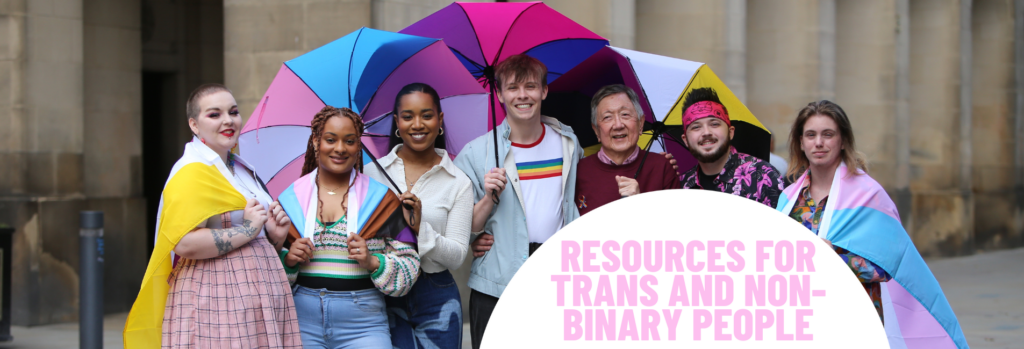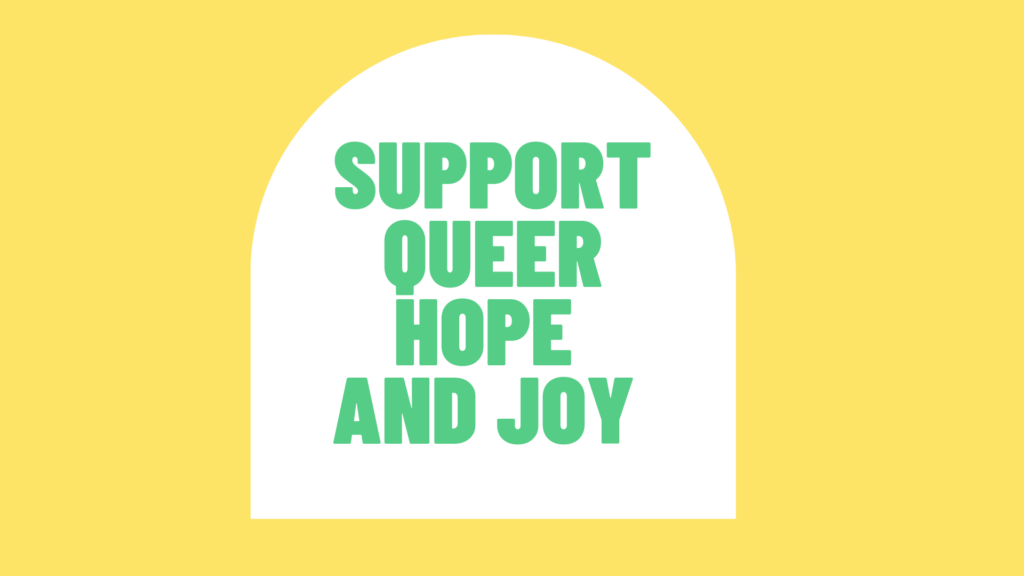
CHECK OUT OUR HANDY RESOURCES
Whether you’re trans or non-binary yourself, or looking for ways to support as an ally, we’ve got loads of resources to help you achieve hope and joy.

Here you can find some brilliant resources, including those that have been produced by LGBT Foundation, specifically for trans and non-binary people.
Check out the list below to find the information that is right for you.
‘Inclusivity – Supporting BAME Trans People’ – Sabah Choudrey and Gires
Published: February 2016
This resource has been made with the interests, safety and rights of BAME trans people at the core, to help improve support and raise awareness for this community. It also includes research and references specific to the UK, as BAME trans research is so often USA-centric, adding to the knowledge that these communities can relate to. This guide will benefit not just BAME trans people, but the people who support them, including LGBTQ and trans organisations, employers, family and allies.
The Transgender Hub is a news and advice website that aims to provide accurate and current information/articles to the transgender, transsexual, crossdresser and LGBTQ community
This online directory lists Transgender support groups around the world!
Trans Unite allows members of the transgender & non binary communities to find a support group local to them (or even online). The site is not for profit and free from advertisements. Users can find a local group and even message them directly from their site using the “Contact Group” button.
MindLine Trans+ – 0300 330 5468
Bristol MindLine has launched a helpline looking to support trans and non-binary individuals, and those questioning their gender. It is also available for family and allies of trans people. Lines are open Mondays and Fridays, 8pm-midnight.
‘Guidance for doctors treating transgender patients’ – General Medical Council
Published: March 2016
The first report of the House of Commons Women and Equalities Committee highlighted significant concerns about doctors’ lack of awareness and consideration in treating transgender patients. These web pages aim to help doctors see how the principles of Good medical practice apply in relation to trans patients and also to explain doctors’ duties under the Equality Act 2010 and other legislation.
Published: February 2016
This guide is for GPs on the care of patients accessing NHS Specialist Gender Identity Services (SGIS). Trans people are entitled in law and policy to equal access but health inequalities remain and trans people have not always had a good experience of NHS care. This guide aims to enable GPs to get ‘up to speed’ on some of the key issues.
‘Your body, your health’ – Men’s Health Forum
Published: November 2015
Written and developed by trans men, Your Body, Your Health – Health choices made easy for trans men, trans masculine and non-binary people explains the various aspects of transition healthcare in an easy-to-read, non-technical way to help you:
– make decisions about your own wellbeing
– deal with the challenges you might meet when dealing with a health care system (and wider society) which can still tend to think in terms of two fixed genders.
‘NHS Interim Protocol Guide’ – Action For Trans Health
Published: September 2014
Action for Trans Health’s guide to what you should expect when seeking out transition related treatment on the NHS.
‘Living My Life – Information for trans people’ – Sexual Health Sheffield
Published: May 2011
An engaging 28 page A5 booklet providing information about people who identify as trans or who are beginning to explore their gender identity.
The booklet features inspirational and affirming photographic images of people with a trans identity.
‘Gender dysphoria services: a guide for General Practitioners’ – GIC’s
Published: April 2013
This document was written by representatives from Gender Identity Clinics (GICs) across the country. It outlines NHS protocol for managing gender dysphoria, advising GP’s on how to refer a patient to specialist services and support them in the meantime.
‘Finding an NHS Gender Identity Clinic’ – NHS
Reviewed: March 2017
This NHS page lists the addresses and contact details of the eight Gender Identity Clinic’s in England.
‘An Interim guide to trans care in England’ – NHS England
Published: July 2013
This 29 page document from NHS England provides extensive guidelines to ensure equal access to healthcare cross the NHS in England. It outlines how a patient should be referred to a specialist clinic, responsibilities of local GP’s to provide care and also different surgical procedures that may be offered.
‘Guidance for GP’s providing healthcare for Trans patients’ – General Medical Council
The General Medical Council has provided detailed guidance on best practice for health care professionals. It outlines the risks of self-medication on physical and mental health and advises when a GP ought to provide bridging prescriptions. There is also lots of guidance on patient confidentiality and disclosure of previous gender history.
‘Trans Health Fact Sheets’ – The National LGBT Partnership
Published: March 2015, May 2016, and September 2017
The National LGBT Partnership have published a collection of factsheets on various aspects of trans health. Areas covered include fertility, hormones, sexual health and mental wellbeing. There are also factsheets specifically for BAME trans health.
‘How to complain to the NHS’ – National Health Service
A guide to the NHS complaints procedure. Everyone has the right to make a complaint about their NHS care, including the use of the Mental Health Act. You also have the right to escalate your complaint to the Parliamentary and Health Service Ombudsman if you are unhapy with the outcome of an initial NHS complaint.
‘What to expect at Nottingham Centre for Transgender Health’ – NHS
This page outlines the referral pathways and services offered at The Nottingham Centre for Transgender Health. There is also guidance on the waiting times for first appointments.
‘Frequently Asked Questions for Sheffield GIC’ – NHS
Updated: 2017
Detailed FAQ document from the Sheffield Gender Identity Clinic which includes information on the referral pathways, waiting times and what services are provided at the clinic.
‘Trans Guides – Issue one – Name Change and Gender Recognition Certificates’ – LGBT Foundation
Published: 2023
‘A guide to changing NHS number and identity’ – Mermaids UK
Published: 2019
Mermaids have written a guide on how to register a change in NHS identity and number. The process is currently under revision, so the information on this page is only a draft.
‘Changing your name and/or title’ – Action for Trans Health
There are a lot of misconceptions about how a person can change their name, yet in fact is is quick, easy and free. ATH have made a detailed guide on how to change your name and title.
‘Registering a name change with HMRC’ – UK Gov
Although the HMRC is usually informed automatically when a gender recognition certificate is obtained, this page explains how to inform them yourself of a gender change yourself. It also explains what HMRC is required to do on your behalf.
‘How to register name changes with Department of Work and Pensions’ – Gendered Intelligence
This page has details on how to inform the Department of Work and Pensions (DWP) about a name and gender change, including which documents are required and where to send them.
Including non-binary people: guidance for service providers and employers
Resource from Scottish Trans Health including definitions of non-binary; Top Tips on Service Provision and Employment and a Glossary of terms related to Gender Identity.
First Steps: An introduction to trans inclusion
This resource series explores best practice for supporting trans employees in the workplace.
‘Guide to UK legal Gender Recognition’ – UK Trans Info
Published: November 2015
Guide on how to obtain a Gender Recognition Certificate under the Gender Recognition Act 2004. This guide was created by UK Trans Info with support and funding from the Scottish Transgender Alliance.
‘Domestic Violence – a resource for trans people’ – NHS
Published: August 2009
‘Gender Recognition: Where Next? – UK Trans Info
Published: January 2016
This report summarises the findings of a survey undertaken during November and December 2015 in collaboration with the Non-Binary Inclusion Project.
The survey, entitled ‘Replace the GRC – but how?’ was created in response to calls for reform of the Gender Recognition Act 2004, in the wake of a Transgender Equality Inquiry conducted by the UK Parliament’s Women and Equalities Committee.
‘A Guide to UK Legal Gender Recognition’ – UK Trans Info
Published: November 2015
This clear and comprehensive 60 page guide, made by UK Trans Info, explains how to apply for Legal Gender Recognition in the UK. It also explains how legally changing gender effects existing marriages and civil partnerships and inheritance. There is also a section on your privacy in relation to previous names and identity.
‘Knowledge is power’ – Gendered Intelligence
Published: November 2015
Knowledge is Power is a project funded by Awards for All. It aims to gather knowledge generated through a series of youth sessions, as well as research and writing carried out by a diverse team of GI community members.
At Gendered Intelligence we think knowledge is not the same as information. Knowledge is something that comes from within. Knowledge comes when an individual has received information but has processed it in a way that offers meaning to their life.
‘Providing services for transgender customers: a guide’ – Government Equalities Office
Published: November 2015
Good practice guidance on providing services that are inclusive of transgender people as customers, clients, users or members.
This guide, produced in partnership with Gendered Intelligence, sets out guidance and good practice examples to help service providers ensure transgender people are welcomed, included and valued as customers, clients, users or members, and to ensure they are treated fairly and appropriately. It also aims to help service providers comply with the law.
‘Recruiting and retaining transgender staff: a guide for employers’ – Government Equalities Office
Published: November 2015
Guidance for employers on recruiting and retaining transgender employees.
This guidance, produced in partnership with Inclusive Employers, is designed to provide employers with practical advice, suggestions and ideas on the recruitment and retention of transgender employees and potential employees. It is also a useful guide for the managers of trans staff and for trans staff themselves. It also aims to help employers comply with the law.
‘E-learning resource on transgender awareness’ – GIRES
The Gender Identity Research and Education Society (GIRES) have created a transgender awareness e-learning resource for employers in both the public and private sector. It has three modules covering: an introduction to gender variance, how to support transitioning employees in the workplace, and how to provide trans inclusive services to the public.
‘Applying for a Gender Recognition Certificate’ – UK Gov
This site briefly explains the application process for a ‘Gender Recognition Certificate’ and includes three different forms and accompanying guidance on each route.
Published: May 2014
This fact sheet answers some questions about legal protections for the privacy of trans* people who give their information to services.
‘Sexual Health Guide for Trans & Non-Binary Young People in Northern Ireland’ – Gender JAM and SAIL
Published: April 2016
If you’re a young trans/non-binary person, it can be really hard to find information on your sexual health. This guide was written by young trans and non-binary people, for young trans & nonbinary people, and only contains information that’s useful for young trans & non-binary people.
This doesn’t replace other sexual health guides – if you want the low-down on contraceptives, safe sex and relationship support, you should check out other sexual health guides too. This guide covers what others don’t – how being a young trans person affects your sexual health.
A team of friendly and open health & well-being professionals and trans* community members, who are dedicated to enhancing the lives of trans* people, their partners and friends. CliniQ offer a queer inclusive and non-judgemental sexual health and well-being service to trans* clients, members of the trans* community, their friends and families.
Published: January 2016
PrEPster aims to educate and agitate for PrEP access in England and beyond.
PrEPster.info and its related activities are produced by a volunteer group of London-based HIV prevention activists. We are independent from any statutory or voluntary sector organisations.
‘Trans Men – Trans Health Matters’ – Terrence Higgins Trust
Published: June 2012
There are many sexual health guides out there, so why is this one different?
Because transmen are different; have different bodies and therefore experience different risks to the general population
‘Trans Women – Trans Health Matters’ – Terrence Higgins Trust
Published: June 2012
There are many sexual health guides out there, so why is this one different?
Because trans women are different; have different bodies and therefore experience different risks to the general population. It’s not always easy for trans women to find correct information about sex and sexual health.
Healthline – LGBTQIA Safe Sex Guide
Published: July 2018
This guide looks to explore how we have sex as LGBT people, and particularly looks to tackle the stigma of non-heterosexual, non-cisgender people engaging in sex.
PRIMED2 : A Sex Guide for Trans Men into Men
This guide addresses the diverse sexual desires and sexual activities of gay, bi, and queer trans men. It includes important information on the choices we have and the questions we should ask to stay safe and healthy: sexually, mentally and emotionally.
Guidance for improving the experience of trans and non-binary people in tertiary education
This fully updated guide shows how educational staff can best support trans and non-binary people.
The ‘Feeling Happy with my Gender’ Fix: A Generation in Transition
A Generation in Transition offers a unique insight into the lived experiences of young people transitioning genders and will provide policy makers with a powerful resource for understanding their lives through their voices; because the real experts are those who know the most – the young people themselves.
Trans Youth in Foster Care: Know Your Rights
Three Circles Fostering, an independent fostering agency based in the north west recently consulted with some young trsns people in Manchester to inform the publication of a new resource for anyone who is supporting trans young people who are in foster care.
Published: May 2015
This toolkit is a collaboration between the Royal College of Nursing (RCN) and Public Health England (PHE).
This is primarily for nurses who work with children and young people, whether in community or hospital settings, including: school nurses, practice nurses, accident and emergency nurses
‘Support resources for trans youth’ – Gendered Intelligence
Gendered Intelligence offer text, email and phone support for young trans people. There is an application process for one-to-one mentoring support for young trans people. They organise an annual trans youth camping trip for 11 -25 year olds. Knowledge is Power, an online resource based on youth experiences and includes information on everything from language and pronouns, obtaining legal recognition to advice on gender expression such as make-up and chest binding.
In addition, although Gendered Intelligence is a support group for transgender youth this resource contains explanations which are generally useful for all family members and for service providers.
‘Resources for Young People’ – Mermaids UK
Mermaids run a youth group for gender diverse and trans people aged 12 – 19 year olds. They also have a helpline and Crisis Text support, for anyone experience mental health crisis. There are also many resources for young people and parents on health, binding, name changing, and further group support.
‘Trans Inclusion Schools Toolkit’ – Brighton and Hove City Council
Published: September 2018
This toolkit advises teachers and decision makers on how to improve transgender inclusion in schools. It includes chapters on how to manage specific issues that gender variant youth will face such as toilets and changing rooms, safeguarding trans youth and how to challenge homophobic and transphobic language in school.
‘The Equality Act 2010 and Schools’ – Department for Education
Published: May 2014
This is a comprehensive guide aimed at teaching staff and governing bodies, advising how pupils ought to be protected under the 2010 Equality Act. This document isn’t specific to gender variant pupils, but also relates to discrimination on the basis of race, sexuality, faith, gender and disability.
‘Transgender Equality in Further Education’ – GIRES
The Gender Identity Research and Education Society (GIRES) have provided a link to an online resource that aims to promote trans equality in further education. It is focussed on both trans learners and staff members.
‘Trans Information for young people’ – The Proud Trust
A collection of resources, by Manchester based organisation The Proud Trust, aimed at school aged youth who are questioning their gender identity. There is signposting to youth support groups, explanation of your rights in school, how to deal with bullying and discrimination and a guide to coming out as trans to your parents and friends.

Volunteering is at the heart of our work, find out how you can start making a difference.

We can’t keep doing life-changing work without your support. Thank you for your support.

Reach out if you need support. We have a range of services that can help you find your happiness.






